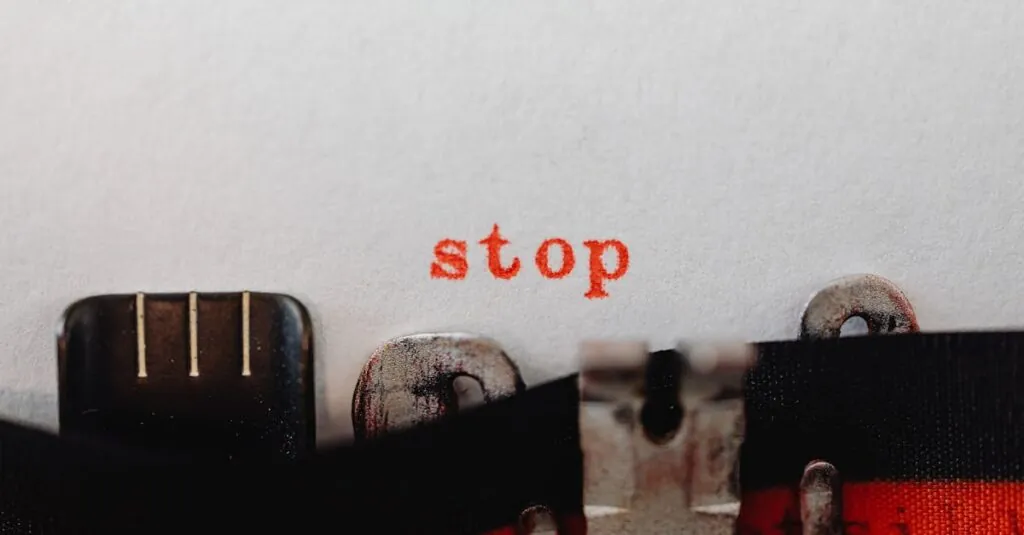Picture this: you’re enjoying a peaceful evening, maybe binge-watching your favorite show, when suddenly your phone rings. It’s a collection agency, and they’re more persistent than a cat trying to catch a laser pointer. If you’ve ever found yourself in this situation, you know how frustrating it can be.
Table of Contents
ToggleUnderstanding Collection Calls
Collection calls are phone calls from creditors seeking payment for overdue debts. They typically occur after a borrower fails to make payments on time.
What Are Collection Calls?
Collection calls involve creditors or collection agencies attempting to recover outstanding debts. These calls can arise from various types of debt, such as credit cards, medical bills, or loans. Agencies may contact debtors through calls, texts, or letters to demand payment. The caller often provides specific information about the debt, including the amount owed and the name of the creditor. Understanding these calls helps individuals recognize their rights and obligations.
Why Collection Calls Happen
Collection calls happen due to missed or late payments on financial obligations. When borrowers do not respond to initial payment notices, creditors escalate their efforts. Creditors aim to recover funds before debts become more difficult to collect. Additionally, the potential impact of unpaid debts on credit scores motivates agencies to contact individuals promptly. Knowing the reasons behind these calls can assist debtors in addressing their financial situations effectively.
Laws and Regulations
Collection calls are governed by specific laws and regulations aimed at protecting consumers from unfair practices. Knowledge of these laws empowers individuals to address collection calls effectively.
Fair Debt Collection Practices Act
The Fair Debt Collection Practices Act (FDCPA) regulates the actions of debt collectors. This Act prohibits harassing conduct, such as repeated calling at odd hours or using abusive language. Debtors cannot be contacted at their workplace if requested not to be. Collectors must provide validation of the debt when asked. Violation of the FDCPA may result in significant penalties for debt collectors.
Consumer Rights
Consumers possess specific rights when facing collection calls. First, they can request verification of the debt and receive clear details about the creditor. They also have the right to dispute any claimed debts within 30 days of the initial contact. Additionally, individuals can instruct collectors to cease communication through a written request, which collectors must honor. Understanding these rights encourages proactive steps in dealing with collectors and prevents potential infringements by agencies.
Understanding Your Options
Many individuals face challenges when dealing with collection calls. Knowing available options empowers consumers to navigate these situations effectively.
Requesting Verification of Debt
Consumers possess the right to request verification of any debt. This process involves asking the collector for documentation proving the validity of the debt in question. A lender must provide this verification, which helps establish whether the debt is legitimate. By doing this, individuals ensure that they are not paying a debt that isn’t theirs. The request engages a 30-day period during which the creditor must cease communication unless verification is provided. Individuals can send their request via certified mail for documentation purposes, keeping records of their correspondence.
Communication Preferences
Setting communication preferences offers consumers control over how they interact with collection agencies. By providing written instructions, individuals can specify times and methods for contact, such as phone calls or mail. Federal regulations require collectors to honor these preferences. Clearly stating a preference can reduce unwanted interruptions, making it easier to manage debts. Additionally, individuals can request that all communication occurs only in writing, further limiting the frequency of phone calls. Establishing boundaries helps maintain peace of mind while negotiating debt repayment.
Strategies to Stop Collection Calls
Taking action can reduce or eliminate unwanted collection calls. These strategies empower individuals to regain control over their communication with debt collectors.
Cease and Desist Letters
Sending a cease and desist letter contains specific instructions to collection agencies. This letter formalizes the request for them to stop contacting individuals regarding the debt. Once received, agencies must comply and cease communication about the debt unless legally permitted to respond. Several resources provide templates for crafting these letters. Individuals should ensure that their letters include identifiable debtor information and clearly state the request. Sending the letter via certified mail offers proof of delivery, enhancing its effectiveness.
Reporting to Authorities
Reporting collection agencies to relevant authorities represents a critical step for consumers facing harassment. Filing complaints with the Federal Trade Commission (FTC) or the Consumer Financial Protection Bureau (CFPB) highlights the importance of protecting rights under the Fair Debt Collection Practices Act. Each agency allows individuals to detail their experiences and report violations of collection practices. Documenting each interaction with collection agencies strengthens the case when filing a report. Keeping records of dates, times, and content of calls provides valuable evidence in these situations.
Facing collection calls can be overwhelming and stressful. However individuals have the power to take control of the situation. By understanding their rights and utilizing effective strategies like requesting debt verification and sending cease and desist letters, they can significantly reduce unwanted interruptions.
It’s essential to stay informed about the laws that protect consumers from harassment and to document all interactions with collection agencies. Taking these proactive steps not only helps in managing debt but also restores peace of mind. With the right knowledge and actions, individuals can navigate their financial challenges confidently and assertively.













